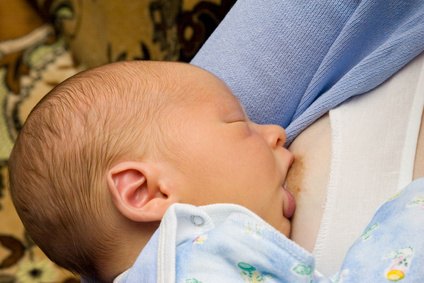
Allergies are more commonly diagnosed in the world than ever before. La Leche League claims that one in five children shows signs of allergies by age 20. Allergies are more documented today because doctors are more easily able to recognize and diagnose allergies than they were years ago. Breastfeeding has many health benefits to infants that carry on through life. One of these benefits is protecting the child against allergies.
How Allergies Occur
Allergies are caused by the body viewing an otherwise harmless substance as harmful. The body will then produce large amounts of immunoglobulin E, an antibody that works to protect the body from allergens. The antibodies attach themselves to tissue and blood cells once they come into contact with the allergen, and proceed to release inflammatory chemicals such as histamines and prostaglandins. These chemicals are what cause the allergy symptoms.
Symptoms of Baby Allergies
Food allergies cause symptoms such as diarrhea, spitting up, cramping, constipation, gas and poor absorption of nutrients. Allergies also effect the eyes, nose and skin. This causes rashes, and discharge from the eyes and nose. It can be hard to tell exactly what's wrong when a baby is young, so parents who have concerns should always visit the family doctor.
Breastfeeding Effects on Child Allergies
Breastfeeding has many benefits, one of which is adding protection against allergies in children. Breast milk contains immunoglobulin A, which prevents foreign proteins from passing into the bloodstream and causing allergic reactions. Breast milk also contains antibodies to pathogens that are in the mother's milk. These antibodies help to protect babies from any allergens that may be in the mother's milk
Breastfeeding and Infant Milk Allergies
Up to three percent of babies have a milk protein allergy. Most children outgrow this allergy by age five, but it can be troubling for parents to feed an infant with a milk allergy. Milk protein can pass through a mother's milk, so doctors of breastfeeding mothers may recommend that a mother limit or eliminate dairy from her diet if the child has a milk allergy.
Treatment of Infant Allergies
If a breastfed infant has allergies, the mother can try an elimination diet for herself. This means cutting out all allergens and then slowly adding them back in one by one. Mothers should keep track as they add foods back into the diet to be sure which is causing the reaction. If parents suspect that a baby has an allergy, the baby should always be taken to the doctor. The doctor can perform a number of tests to discover the cause of the allergic reaction. This includes blood tests, stool tests and a skin test.
No comments:
Post a Comment